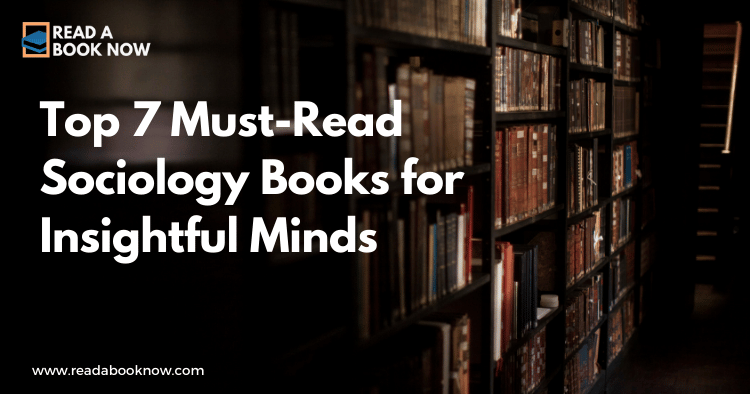Top 7 Must-Read Sociology Books for Insightful Minds
Table of Contents
- Introduction
- 1. “The Sociological Imagination” by C. Wright Mills
- 2. “The Presentation of Self in Everyday Life” by Erving Goffman
- 3. “Bowling Alone: The Collapse and Revival of American Community” by Robert D. Putnam
- 4. “Gender Trouble: Feminism and the Subversion of Identity” by Judith Butler
- 5. “The Structure of Social Change” by Talcott Parsons
- 6. “Evicted: Poverty and Profit in the American City” by Matthew Desmond
- 7. “Sapiens: A Brief History of Humankind” by Yuval Noah Harari
- Conclusion
- FAQs
Introduction
Sociology is a fascinating field that explores the intricate web of human relationships, societal structures, and cultural norms. For those seeking to deepen their understanding of the social world, reading foundational texts is essential. This article highlights seven sociology books that provide invaluable insights into various aspects of human behavior and social dynamics. Whether you’re a student, a seasoned sociologist, or just someone curious about society, these books will inspire and challenge your perspectives.
1. “The Sociological Imagination” by C. Wright Mills
C. Wright Mills’ The Sociological Imagination is a seminal work that encourages readers to connect personal experiences with broader social forces. Mills argues for an understanding of the interplay between individual lives and societal structures, coining the term “sociological imagination” to describe this critical perspective.
“The sociological imagination enables us to grasp history and biography and the relations between the two within society.”
The book is particularly effective in illustrating how personal troubles often reflect larger public issues. For example, unemployment can feel like a personal failure, but Mills prompts us to consider the economic conditions and policies that contribute to job scarcity.
Key Takeaways:
- Understand the link between personal experiences and societal trends.
- Challenge common assumptions about individual agency.
- Enhance critical thinking about social issues.
For further exploration, check out The Sociological Imagination on Goodreads.
2. “The Presentation of Self in Everyday Life” by Erving Goffman
Erving Goffman’s The Presentation of Self in Everyday Life introduces the concept of dramaturgy, likening social interactions to performances on a stage. Goffman argues that individuals present themselves in ways that are favorable to their audience, managing impressions through careful control of their behavior and appearance.
“Life is not a mere game; it is a drama, and we are all actors.”
This book delves into how people navigate their social worlds, using front-stage and back-stage personas. Goffman’s insights are particularly relevant in today’s digital age, where social media has transformed how we curate our identities.
Key Takeaways:
- Explore the performative nature of social interactions.
- Understand the importance of context in shaping behavior.
- Examine how self-presentation affects relationships.
For more information, visit The Presentation of Self in Everyday Life on JSTOR.
3. “Bowling Alone: The Collapse and Revival of American Community” by Robert D. Putnam
In Bowling Alone, Robert D. Putnam examines the decline of social capital in America and its implications for community life. Through extensive research, Putnam reveals that participation in community activities, from bowling leagues to church gatherings, has significantly decreased over the decades.
“Social capital… is the glue that holds our communities together.”
This book emphasizes the importance of social connections for individual well-being and societal health. Putnam argues that rebuilding social capital is crucial for fostering a sense of community and shared purpose.
Key Takeaways:
- Recognize the decline of social engagement in America.
- Understand the relationship between social capital and community health.
- Explore practical solutions for revitalizing community life.
For a detailed look at this topic, check out Bowling Alone on the National Civic League.
4. “Gender Trouble: Feminism and the Subversion of Identity” by Judith Butler
Judith Butler’s Gender Trouble is a groundbreaking work that challenges traditional notions of gender and identity. Butler argues that gender is not a fixed trait but rather a performance shaped by societal norms and expectations. This book has been instrumental in feminist theory and LGBTQ+ studies.
“Gender is not something we are, but something we do.”
Butler’s concept of “gender performativity” suggests that gender is constructed through repeated behaviors and expressions, leading to a rethinking of how we understand identity. This work encourages readers to question binary notions of gender and consider the fluidity of identity.
Key Takeaways:
- Challenge traditional ideas of gender and identity.
- Explore the concept of gender performativity.
- Understand the societal implications of gender norms.
For further reading, visit Gender Trouble on Google Books.
5. “The Structure of Social Change” by Talcott Parsons
In The Structure of Social Change, Talcott Parsons presents a comprehensive framework for understanding societal evolution. Parsons explores how social systems adapt to changes in the environment, emphasizing the importance of values, norms, and institutions in maintaining social order.
“Social change is an inevitable process that reflects the dynamic nature of society.”
This book is fundamental for those interested in the dynamics of social change and stability. Parsons’ theory helps readers grasp how societies evolve over time while preserving essential functions and structures.
Key Takeaways:
- Understand the mechanisms of social change.
- Examine the relationship between values, norms, and institutions.
- Explore the balance between change and stability in societies.
For a deeper dive, check out The Structure of Social Change on Amazon.
6. “Evicted: Poverty and Profit in the American City” by Matthew Desmond
Matthew Desmond’s Evicted provides a poignant examination of the housing crisis in America, focusing on the lives of low-income families in Milwaukee. Through immersive ethnographic research, Desmond sheds light on the harsh realities of eviction and its profound impact on individuals and communities.
“Eviction is a cause, not just a condition, of poverty.”
This book reveals how housing instability exacerbates poverty and inequality, challenging readers to consider the systemic issues that contribute to housing insecurity. Desmond’s work is a call to action, advocating for policy changes to address these pressing social issues.
Key Takeaways:
- Understand the link between housing and poverty.
- Explore the systemic nature of eviction and its consequences.
- Advocate for policy reforms to support housing stability.
For further insights, visit Evicted on the University of Chicago Press.
7. “Sapiens: A Brief History of Humankind” by Yuval Noah Harari
While not strictly a sociology text, Yuval Noah Harari’s Sapiens offers a sweeping overview of human history and the social structures that have shaped our species. Harari explores how cognitive, agricultural, and scientific revolutions have transformed human societies, influencing everything from economics to politics.
“To understand the present, we must understand the past.”
This book is a thought-provoking journey through time, encouraging readers to reflect on the factors that have shaped human behavior and social systems. Harari’s engaging narrative makes complex ideas accessible and relatable.
Key Takeaways:
- Gain a historical perspective on human societies.
- Explore the evolution of social structures and norms.
- Reflect on the implications of historical events on contemporary life.
For more details, check out Sapiens on Penguin Random House.
Conclusion
These seven sociology books provide a rich tapestry of insights into the human experience, exploring the complexities of society and relationships. By engaging with these texts, readers can develop a deeper understanding of social dynamics and the forces that shape our lives. Whether you’re looking for theoretical frameworks or real-world applications, these essential reads will enhance your sociological imagination and inspire thoughtful discussions.




